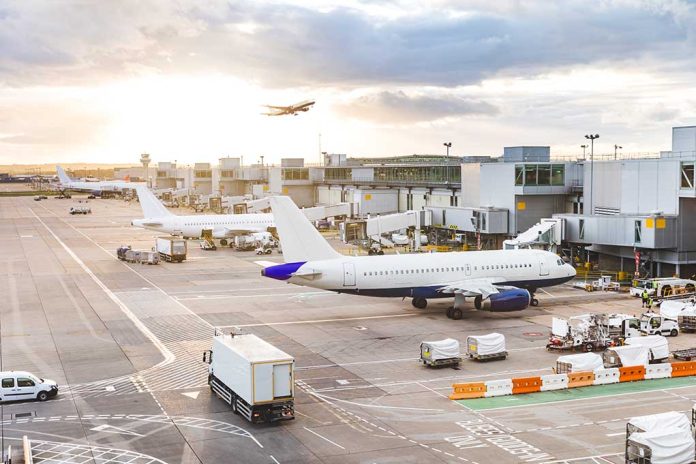
Israel strikes Yemen airport with 50 bombs after being excluded from US-Houthi ceasefire, disabling runways and destroying commercial aircraft while vowing to “defend itself by itself” against continued Houthi threats.
Key Takeaways
- Israel has issued evacuation warnings for three key Yemeni ports—Ras Isa, Hodeidah, and Salif—following earlier strikes that disabled Sanaa International Airport.
- President Trump announced a ceasefire between the US and Houthis that excluded Israel, leaving Israel to independently defend against continued Houthi threats.
- Israeli strikes involved 50 bombs requiring mid-air refueling, demonstrating Israel’s military reach that could potentially extend to Iran.
- The Houthis reported at least seven people killed and 74 wounded from Israeli strikes while vowing to continue attacks on Israel in support of Palestinians in Gaza.
- Defense Minister Israel Katz emphasized Israel’s determination to defend itself without relying on international agreements that exclude Israeli security concerns.
Israel Escalates Military Action Against Houthi Targets
Israel has launched a significant military campaign against Houthi-controlled areas in Yemen, beginning with devastating strikes on Sanaa International Airport that disabled runways and destroyed commercial aircraft. This marks a major escalation after the Israeli military intercepted a Houthi-launched ballistic missile near Tel Aviv’s Ben-Gurion International Airport. The sophisticated operation involved approximately 50 bombs and required mid-air refueling, demonstrating Israel’s long-range strike capabilities. Israeli forces have now expanded their warnings to include three crucial Yemeni ports—Ras Isa, Hodeidah, and Salif—signaling potential further strikes against Houthi infrastructure.
The human toll of this conflict continues to mount, with Houthi authorities reporting at least seven people killed and 74 wounded over two days of Israeli attacks. Israel’s decision to issue evacuation warnings indicates their targeting strategy focuses on military and infrastructure objectives while attempting to minimize civilian casualties. This pattern of warnings followed by strikes is consistent with Israel’s approach in other theaters, including Gaza, where Israel has faced criticism despite such measures. The current escalation represents Israel’s most significant direct military engagement with Yemen’s Houthi forces since the beginning of regional tensions.
US-Houthi Ceasefire Excludes Israel
President Trump recently announced that America would cease strikes against the Houthis, claiming they had “capitulated” and agreed to stop targeting shipping in the Red Sea. This ceasefire agreement, brokered with the assistance of Oman’s foreign minister Badr al-Busaidi, explicitly excludes Israel, leaving the Jewish state to defend its territory and interests independently. The Houthis have made clear that while they may halt attacks on international shipping, they will continue targeting Israel in solidarity with Palestinians in Gaza, creating a precarious security situation for Israel despite the US-brokered agreement.
“Israel must be able to defend itself by itself against any threat and any enemy. This has been true in the face of many past challenges, and it will remain true in the future,” said Defense Minister Israel Katz.
The diplomatic maneuvers by the Biden-Harris administration have drawn criticism from conservative analysts who view the exclusion of Israel from protection as abandoning a key ally. Israel’s response has been swift and decisive, with officials emphasizing their capabilities and determination to address threats without external support. The situation highlights the complex dynamics of Middle Eastern alliances and the ongoing challenges Israel faces in securing recognition of its security concerns within international agreements negotiated by the current administration.
Regional Implications and Houthi Warnings
The conflict has broader regional implications as Houthi leaders have issued direct warnings about potential consequences for “President Trump’s planned visit to the region”. stated Mahdi al-Mashat, head of the Houthis’ supreme political council, delivered a thinly veiled threat stating, “We indirectly informed the Americans that the continued escalation will affect the criminal Trump’s visit to the region, and we have not informed them of anything else.”
Meanwhile, shipping data suggests larger maritime companies are cautiously returning to Red Sea routes, though traffic remains significantly below normal levels. The ongoing threat of Houthi attacks continues to impact global commerce, with shipping delays and increased costs affecting supply chains worldwide. Israel’s military operations appear designed to degrade Houthi capabilities to launch such attacks, potentially stabilizing regional maritime security over time. As Israel continues to act independently against Houthi threats, the effectiveness of these operations will be closely monitored by regional powers and international shipping interests alike.





